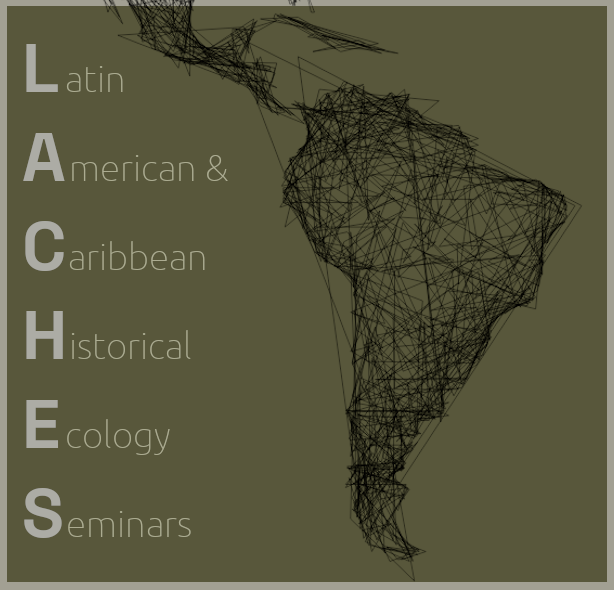LACHES
 The Latin American and Caribbean Historical Ecology Seminars (LACHES) highlight a diverse research field characterized by an ambition to link knowledge about the past to present-day challenges by contributing to debates in natural resource and environmental management, deepening our understanding of resilience and vulnerability, and informing pathways to economic, ecological, and societal sustainability.
The Latin American and Caribbean Historical Ecology Seminars (LACHES) highlight a diverse research field characterized by an ambition to link knowledge about the past to present-day challenges by contributing to debates in natural resource and environmental management, deepening our understanding of resilience and vulnerability, and informing pathways to economic, ecological, and societal sustainability.
Upcoming seminars
There are no upcoming seminars at this time.
Previous seminars
Monday, December 5, 2022, José M. Capriles, The Pennsylvania State University
Mummified Parrots and Desiccated Feathers: Exploring the Evidence for Transregional Interaction between the Atacama Desert and Amazonia in Pre-Columbian Times
In this seminar, Dr. José M. Capriles (Associate Professor of Anthropology at The Pennsylvania State University) will explore the archaeological record of tropical birds in the Atacama Desert where colorful feathers and even actual macaws and other tropical parrots have been recovered from various temporal and spatial cultural contexts signaling the persisting significance of these beings for signaling relational wealth.
Dr. José Capriles, is an anthropological archaeologist specializing in environmental archaeology, human ecology and zooarchaeology. His research is focused on how did humans adapt to the changing environmental conditions of the South American Andes and Amazonia during the late Pleistocene-early Holocene transition?, He conducts research in Bolivia and Chile and collaborates broadly with international interdisciplinary research teams. He is also engaged in the preservation of cultural heritage through public outreach and the active participation of indigenous and local communities in archaeological research.
October 3rd, 2022 Joel D. Gunn, lecturer in the Department of Anthropology, University of North Carolina at Greenboro, If the Future Past Teaches, What does the Present Learn?
What insights to the convergence of social faults in the first millennium portend for those of the 21st century? At what moment will the system crack? The first millennium CE is a time curiously apt for analogies to the current situation….
August 1, 2022: 16-17 Dr. Florencio Delgado (Department of Liberal Arts, Universidad San Francisco de Quito (USFQ)) AND Quirino Olivera (Asociación para la Investigación Científica de la Amazonía de Perú (ASICAMPE)
Anthropogenic Changes in Lowland and Insular Ecuador
Public-Religious Monumental Architecture in the Valley of Marañón, Upper Amazonia of Perú / Arquitectura Monumental de Carácter Público-Religioso en el Valle del Marañón, Alta Amazonia de Perú
June 6, 2022, 16-18 Elizabeth Graham, Institute of Archaeology, University College London, The Waste of Time and Soil Security.
In this seminar, Graham share her ideas on the role of the decomposition of the urban and peri-urban built environments in soil formation; on why thinking about waste is more important than thinking about recycling; on the limitations of the Circular Economy; and on how a combination of archaeology and soil science can improve soil security.
April 4th, 2022 William Balée, Professor of Anthropology Tulane University, Landscape Transformation and Traditional Ecological Knowledge (TEK) in the Neotropics
Since the 1998 publication of William Balée’s edited seminal volume Advances in Historical Ecology, historical ecological research in Latin America and the Caribbean has examined complex socio-ecological interactions and historical trajectories in a wide variety of landscapes. In this seminar on Landscape Transformation and Traditional Ecological Knowledge (TEK) in the Neotropics Bill Balée summarises some of his work on the neotropics. click on the link below to join the filmed seminar.
Register and get the passcode to our LACHES seminars by sending an email to contact@ihopenet.org
The seminar series is currently arranged sporadically and is sponsored by IHOPE (ihopenet.org) and organized by a planning committee of scholars in Bolivia (Universidad Mayor de San Andrés), Brazil (Universidade de São Paulo), and Sweden (University of Gothenburg and Uppsala University). Drawing on case studies as starting point, these open seminars (in English, Spanish, or Portuguese) will discuss practical challenges and opportunities of historical ecological research, with particular reference to inclusive transdisciplinary research, actionable science, and informing policy.
